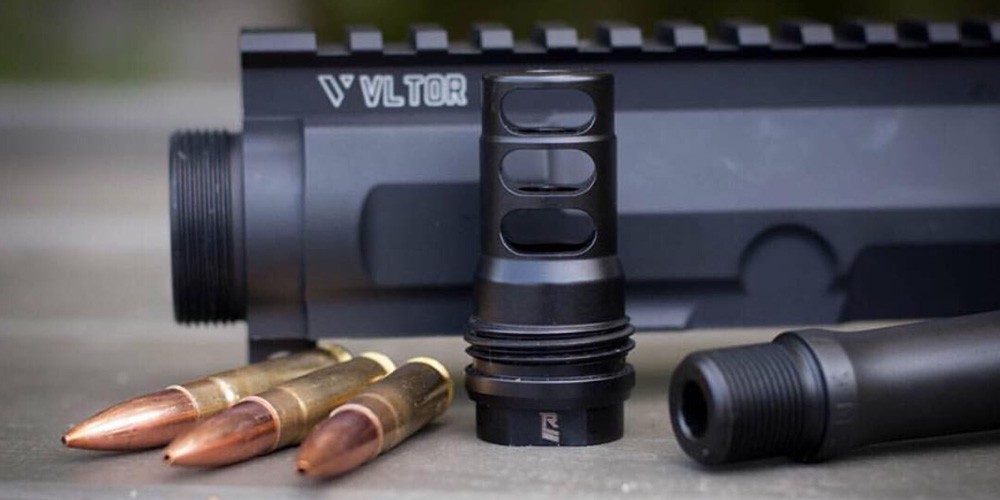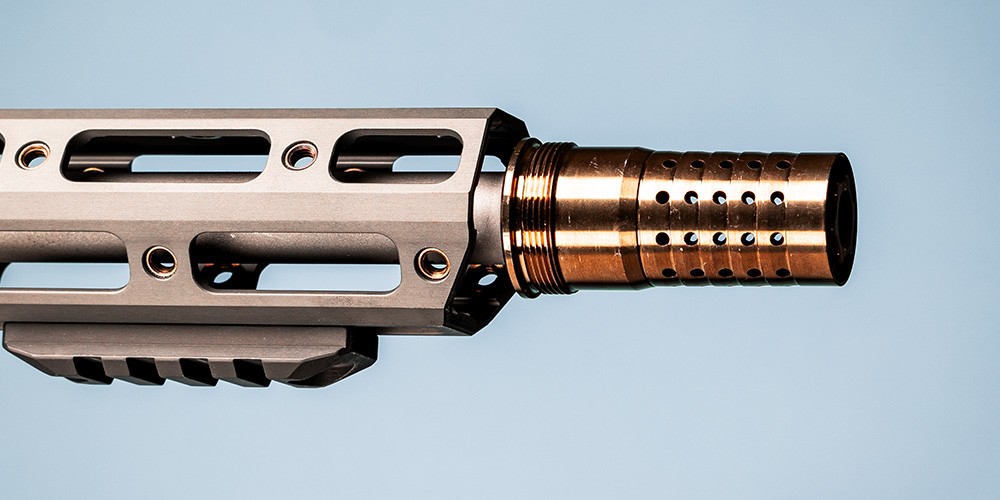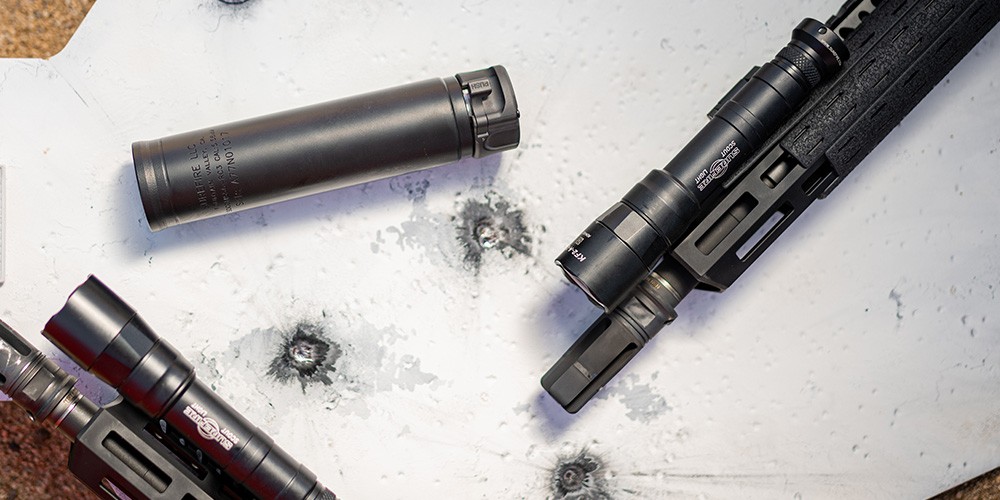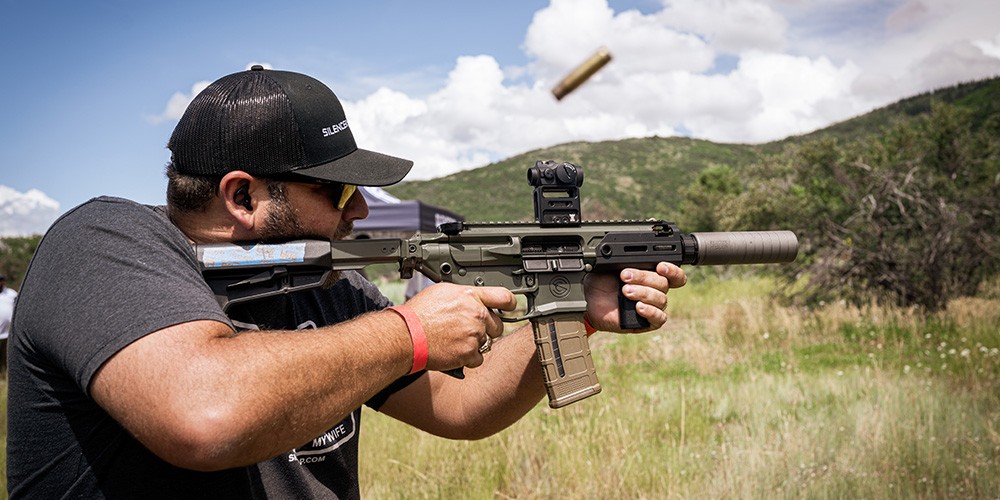

One topic that repeatedly comes up on forums and among firearms enthusiasts is the difference between muzzle brakes and compensators (and flash hiders, to a lesser extent).
To help resolve this issue, we'll examine what makes these muzzle devices different and go over everything you need to know to decide which muzzle accessory belongs on your gun.
We'll start with what exactly a muzzle brake and compensator are, how they're different, and how to choose, and then we'll touch briefly on some other types of muzzle devices to consider before we wrap up.
Table of Contents
What Exactly Is a Muzzle Brake?
A muzzle brake is a device that is designed to be attached to the muzzle (the end of the barrel where the bullet exits) of a firearm to redirect the escaping combustion gases when a round is fired. These gases are directed sideways to reduce the amount of recoil the shooter feels.
Originally, these muzzle devices were most common on rifles firing large, heavy-hitting calibers like .50 BMG and others that would otherwise be a bit rough on a shooter's shoulder. These days, you can find them on various firearms, including pistols and shotguns.
Less felt recoil allows for faster follow-up shots by the shooter. Even the hardiest and most experienced shooters will appreciate less of a beating on their shoulder during long strings of fire or when firing a hefty round such as a magnum rifle cartridge or 3.5" shotshells. Lower recoil also allows for better accuracy and quicker follow-up shots.
Brakes are intended primarily to redirect the muzzle blast and propellant gases to the side, which also helps eliminate or dissipate some of the escaping gases pushing the rifle back into you. The downside of this is more muzzle blast and concussion, which can be very loud and can disrupt the environment you're shooting in.
We'll discuss this further and how a compensator might compare, but be aware that a muzzle brake might reduce the felt recoil, but all that energy still has to go somewhere.
You won't make many friends in an indoor range or in the prone position on a group firing line with a muzzle brake, as the people next to you will bear the brunt of that blast in terms of noise and concussive force. That said, the reduced recoil is excellent if you're shooting in the open or by yourself.
Lastly, some muzzle brakes are externally threaded or cut for a quick-detach suppressor system so that you can quickly and easily mount a compatible suppressor to the muzzle device. This allows you to install or remove your suppressor quickly without tools or removing the muzzle brake.


What Exactly Is a Compensator?
A compensator works very similarly to a muzzle brake, except that it redirects the escaping gases to help eliminate the upward recoil impulse, which we call muzzle rise or muzzle climb.
This is especially beneficial under rapid semi-auto or fully automatic fire, as it helps keep the firearm on target and means less reticle movement. That's why many pistol and rifle competition shooters utilize compensators.
By directing combustion gases upwards, the rifle effectively controls vertical recoil on its own and minimizes horizontal recoil.
The shooter can even tune some compensators to perfectly counteract the upward recoil impulse of a particular rifle and round combination. This is great for anyone who often shoots multiple ammo types, such as one round for training and one for competition or self-defense.
Finally, like muzzle brakes, many compensators are also externally threaded or channeled so that you can attach a suppressor directly to them. This gives you the option to quickly install or remove a suppressor in the field, depending on your needs.


Muzzle Brakes vs Compensators: Which One Is Right For You?
Muzzle brakes and compensators accomplish similar jobs but do so in different ways. Both devices focus on reducing recoil; the major difference is how they do it.
Brakes primarily aim to disperse gases laterally to keep the rifle more stable, particularly from support positions such as prone or rest. Compensators aim to drive the muzzle of a rifle down to combat muzzle rise, which is more valuable when shooting freehanded. Both devices can be used to attach silencers as well.
A muzzle brake is usually the best choice for hunting, long-range shooting, and other applications where you're often shooting heavily recoiling rounds with long gaps between shots.
They're convenient for long-range precision shooting where you want to be able to spot your hits (or misses, we don't judge) and want to keep your shoulder intact after a long day of shooting big bullets downrange.
If you plan on shooting rapid strings of fire, such as in a 3-gun competition or even a defensive or tactical setting, then a compensator is probably best. Reducing felt recoil isn't as important as keeping your sights on target and being able to place follow-up shots quickly and accurately in those types of situations.
Of course, there are a number of hybrid devices out there that combine some of the effects of a compensator and some of the effects of a muzzle brake, but you won't get as much benefit either way as you would with a purpose-built device.
Still, they might be worth exploring if you want to split the difference between eliminating a lot of felt recoil and eliminating a lot of muzzle flip.
Different Types of Muzzle Devices
In addition to muzzle brakes and compensators, two other common types of muzzle devices are flash hiders and suppressors.
Flash Hiders
Flash hiders do exactly what the name implies and help minimize the firearm's muzzle flash. They do this by breaking up the unburnt powder and combustion gases that exit the end of the barrel. This helps to eliminate or at least minimize the bright flash you (and others) see when firing.
Reducing this visible light at the muzzle can be advantageous in low-light shooting scenarios like hunting or tactical applications. Predator hunters who primarily hunt at dusk and dawn have long prioritized flash reduction.
It's also great for shooting in a darker environment, as your target won't be as obscured by the flash. This is especially important in rifles with shorter barrels as you'll usually have more unburnt powder with a shorter barrel, which can generate quite a fireball at the muzzle.


Suppressors
In our opinion suppressors, also called silencers, are the best muzzle device. A suppressor can take your firearm to the next level by attaching to your existing muzzle brake, compensator, or flash hider using a QD system.
Silencers reduce recoil like a muzzle brake or compensator, reduce flash like a flash hider, and also protect your hearing and diminish the sound of a firearm. Due to their massive benefits to shooters, suppressors have been adopted for use in tactical training, competition shooting, and hunting.
They do this by dispersing the expanding gases through a series of internal baffles that are not dissimilar from the baffles inside a car or motorcycle muffler. These baffles help to reduce the decibel level of a fired gunshot and can render the report of some rounds hearing safe.


Conclusion
Understanding the differences between muzzle brakes and compensators is vital for getting the most out of your firearm.
Both devices significantly enhance shooting performance by managing recoil, albeit in different ways. Muzzle brakes reduce felt recoil, which is perfect for long-range shooting and heavy-caliber firearms. On the other hand, compensators excel at controlling muzzle rise, offering a substantial advantage in rapid-fire scenarios and competitive shooting.
Exploring other muzzle devices like flash hiders and suppressors can enhance your shooting experience by reducing muzzle flash and noise.
Ultimately, the right choice depends on your specific needs and shooting style, but with the proper understanding and technology, you can significantly improve your firearm's performance and shooting experience.





